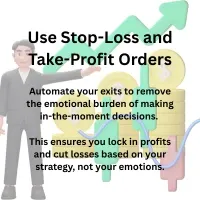Understand the Psychological Challenges Forex Traders Face. Learn the Techniques for Managing Emotions
Imagine you're sitting in front of your computer, staring at the Forex trading charts. The numbers keep moving, the market is jumping up and down, and every decision feels like it's the most important one of your life. As a beginner in this field, you may not know how to control emotions in trading.
But that's where the game begins!
 |
Your heart races, your palms sweat, and suddenly you feel like you can’t control your thoughts while you trade! You're unsure about your next move.
Many traders encounter this issue when they first begin trading. But it doesn’t have to be this way. In this article, we’ll dive into the psychology of Forex trading. As an experienced Forex trader for years, I'll share some tips on controlling your emotions while trading.
Suggested articles for you:
The Importance of Forex Trading Psychology | Psychology and Forex Trading Go Hand-in-Hand
Forex trading isn't just about knowing charts, technical analysis, and market trends. In fact, the most successful traders are not the ones who know everything about the market. They are the ones who can control their emotions during trading.
They know how to control their emotions while trading. They decide something and stick to their trading plan. Why? Because trading is a lot like life—it’s full of highs and lows. Just like life, there are wins and losses. But emotions can often lead to poor decisions. So, to be a successful Forex Trader, you need to learn how to manage your emotions during Forex trading.
Let’s start with a story.
John, a beginner Forex trader, had a great week. His trades were all successful, and he was feeling confident. But as soon as he made one bad trade, his emotions took over. He started making risky decisions to “get his money back,” hoping that he could recover his losses. This led to even bigger losses.
What went wrong?
John lost control of his emotions. And once you lose control of your emotions, your trading decisions can go off course very quickly. John’s experience is not unique. Many traders face the same challenges, but the key to becoming a successful trader is learning to control your emotions and stay calm.
Why Emotions Get in the Way of Good Trading
The biggest challenge in Forex trading is the unpredictability of the market. You can study the charts, but the market can move in unexpected directions. This is where emotions come into play.
Here are the most common emotions traders experience:
Fear: Fear of losing money can make traders hesitate to enter trades or close them too early.
Greed: The desire to make more money than you originally planned can lead to overtrading, which increases your risk.
Excitement: Sometimes, traders get overly excited about a trade and make decisions impulsively, without proper analysis.
Frustration: If things aren’t going well, traders might feel frustrated and take unnecessary risks to recover their losses.
Emotions like fear, greed, and frustration cause traders to make decisions based on their feelings, rather than logic. However, if one makes a decision based on their emotions, it may derail their strategies. In turn, the whole idea may lead to immediate or long-term losses.
Suggested for You
How to Control Your Emotions in Trading?
Now that we know why emotions can be dangerous in Forex trading, let’s talk about how to control them.
1. Create a Trading Plan and Stick to It
The first step in controlling your emotions is having a clear trading plan. Your plan should include things like:
Your trading strategy
The amount of money you are willing to risk
Entry and exit points
Risk-reward ratios
Having a plan reduces uncertainty and helps you make decisions based on facts, not feelings. When you stick to your plan, you’re less likely to make emotional decisions.
Pro Tip: Write down your plan and review it before every trade. This can help you stay focused and remind you of your goals.
2. Set Realistic Expectations
Many new traders start Forex trading with the expectation that they will make huge profits right away. However, this unrealistic expectation often leads to disappointment when the market doesn’t move as predicted.
It’s important to set realistic goals. Understand that trading is not about getting rich quickly; it’s about consistent gains over time.
A study conducted by the National Futures Association (NFA) found that about 70% of Forex traders lose money in the first year of trading. This is because they often expect too much, too soon.
Realistic expectation: Don’t expect to win every trade. Losses are a part of the game. The goal is to win more than you lose over the long run.
3. Practice Patience
Forex trading requires a lot of patience. It’s not about making quick decisions. In fact, the best traders are often the ones who wait for the right opportunities.
Imagine you’re fishing. You don’t expect the fish to bite every time you throw your bait into the water. Sometimes you have to wait, sometimes you have to reel in and try again. The same goes for Forex trading. You have to wait for the right setups and not rush into trades out of boredom or impatience.
Patience tip: Don’t trade just for the sake of trading. Wait for the right moment when all your criteria line up.
4. Use Stop Losses and Take Profits
One of the best ways to control your emotions in Forex trading is by using stop losses and take profits. These are tools that help you set predetermined levels where your trades will automatically close, either when you’ve lost a certain amount of money or when you’ve reached your profit target.
Using stop losses helps prevent you from losing more money than you can afford. Take profit orders allow you to lock in profits without constantly checking the market. This reduces emotional stress and helps you stay disciplined.
Example of Stop Loss and Take Profit
With these levels in place, you don’t have to monitor the market 24/7. Let the system do the work for you.
5. Control Your Risk
Risk management is key to controlling emotions. One of the biggest mistakes traders make is risking too much on a single trade. If you risk too much, even a small loss can feel devastating and trigger emotional reactions like fear or anger.
Traders should only risk a small percentage of their trading capital on each trade. A general rule of thumb is to risk no more than 1-2% of your capital on any given trade. This helps you stay calm, even during periods of loss.
Risk Management Tip: Always calculate your risk before entering a trade. Never risk more than you’re willing to lose.
6. Learn to Accept Losses
No one likes losing money, but the reality of trading is that losses are inevitable. The key is not to let losses affect your future trades.
Here’s how to handle losses:
Accept them: Every trader faces losses. It’s part of the journey.
Don’t chase losses: If you lose a trade, don’t try to make it back immediately. This often leads to overtrading and bigger losses.
Learn from them: Analyse your loss and see if there was anything you could have done differently. This will help you avoid making the same mistake twice.
7. Keep Emotions in Check with Meditation and Mindfulness
Many top traders practice meditation or mindfulness to stay focused and control their emotions. These techniques help you stay present and calm, even when the market is volatile.
Meditation can help you clear your mind before making trading decisions. It helps reduce stress, anxiety, and fear, all of which can cloud your judgment.
Conclusion: Mastering Forex Trading Psychology
Forex trading can be an exciting yet challenging journey. To succeed, you need to understand that trading is not just about technical analysis and market knowledge. It’s about controlling your emotions, sticking to your trading plan, and managing risk.
By practising patience, setting realistic expectations, and using tools like stop losses, you can improve your trading psychology and make better decisions. Remember, the best traders are not those who win every trade, but those who can handle both the highs and lows of the market with a calm and steady mind.
So, the next time you feel the rush of excitement or fear in a trade, take a deep breath, follow your plan, and trust that emotional control is the key to long-term success.
Happy trading!
















